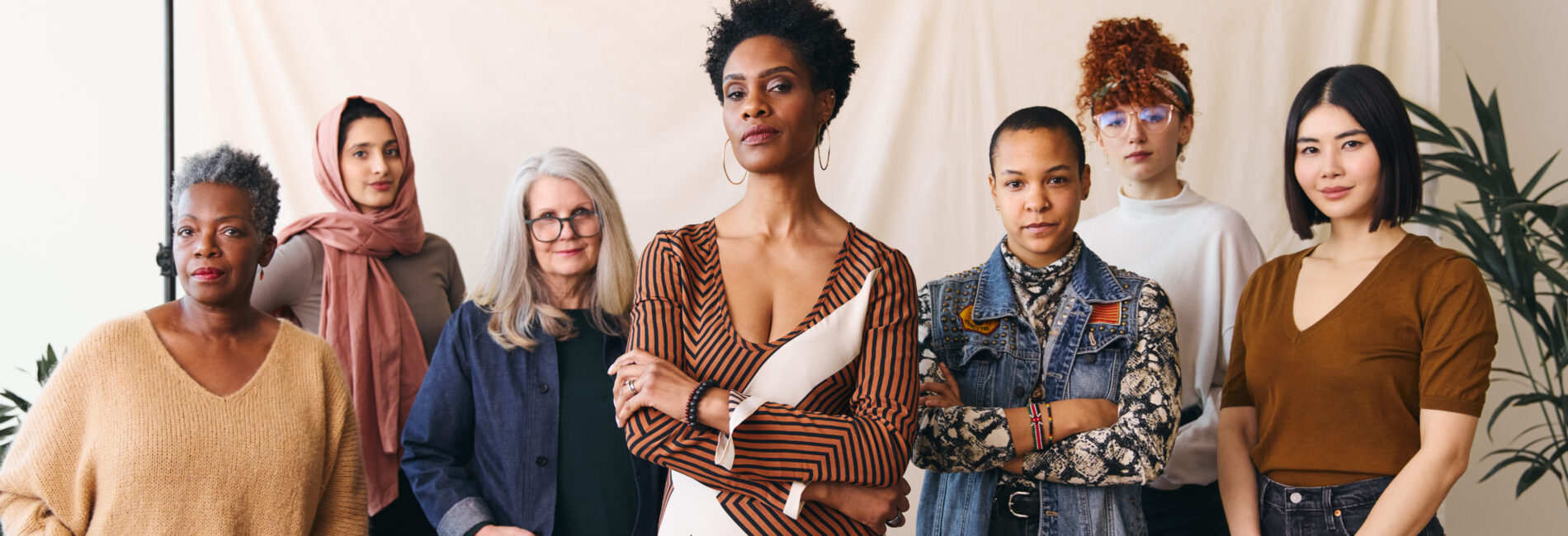A political divide that leaves women underrepresented
The political divide in this country is profound, and the upcoming midterms will determine a great deal about the direction we will take as a nation, specifically the rights afforded to women. With a gaping disparity of women in public office, it was time to look at the data and really polarize just how gaping that disparity is.
Only 31% of legislators are women.
National Conference of State Legislature
According to the most recent data from the Inter-Parliamentary Union, the US ranks 75th out of 193 countries in female elected officials in their national legislatures or parliaments. At the state level, according to the National Conference of State Legislatures, only 31% of legislators are women, and The Center for American Women in Politics reports that just 8.2% of legislative offices are held by women of color.
Representation in this country is sorely lacking. However, one national non-profit political organization, Emerge America, has been working to increase the number of female Democrats for over twenty years. Their record of success is undeniable. Today, I spoke with the President of that organization A’shanti F. Gholar about the organization’s mission, its training programs and how you, the reader, can run for office!
Lauren Flick: Tell me more about the mission of Emerge?
Gholar: The mission of Emerge is to recruit and train democratic women to run for office and change the face of politics and our country. We were started in 2002 by a group of women who lived in the Bay Area in California. They looked around and they saw that there weren’t a lot of women in elected office, and they wanted to do their part to help get more women elected. They wanted to change the face of politics, and how they wanted to do that was by bringing women together by creating training programs to demystify what it takes to run for office.
By 2005, the national organization of Emerge was created. And 20 years later, we have 27 state affiliates and we’ve trained women in 46 states and territories. We’ve trained 5,000 women to run for office, over half of them have run for office and one and we currently have over a thousand serving in an elected office. Over half of our Emerge alums on the ballot are women of the New American Majority—Black, Brown and Indigenous women and women of color, as well as LGBTQ+, young and unmarried women. Emerge is literally changing the face of politics to create an inclusive democracy.

Flick: It’s incredible work your organization is doing for this country. And the programs look intense. I see on your website that your ‘Signature program” is a six month, 70 hour training course to give women the skills they need to run and win. Tell me what that training entails.
Gholar: The Signature Program is the 70 hour intensive workshop. Participants meet one weekend a month for six months and receive comprehensive training on a wide range of topics from public speaking to fundraising and campaign strategy to media training.
We provide the classes, so anyone who wants to run can. Often when talking about women running for office, the first thing that we think about is all the things that are wrong with us or all the things that should stop us from running for office. But, if you have a reason to run, then you should.
Also, I should add that we do have a boot camp program for active candidates on the ballot who have yet to run for office, but want to do an immersed training program. We take the 70 hours training and we condense it down to two-and-a-half intensive days over a weekend. So it’s a crash course of running for office.
"After 'Roe v. Wade' - when the U.S. Supreme Court legalized abortion in 1973 - I thought the national conversation about abortion and birth control would be over. It was not."
— Karen DeCrow
Flick: With the recent overturning of Roe v. Wade, and the climate of extremism on the Right, let’s talk more about the importance of the upcoming midterms. Can you give me idea of how you see the landscape for Democrats this November?
Gholar: I actually don’t see things by cycle; every year is an election year. But, yes, we need to pay attention to what’s going on this year. We have everything from our federal races to our statewide races. Everything is going to be important.
After the fall of Roe, more people are paying attention to the races, and they’re learning which races have an impact on abortion rights. Most people just really kind of thought that this issue is at the federal level, but now that this decision is back to the states, it is really making people pay attention to races they might have overlooked.
For instance, when we’re thinking about abortion, these law enforcement positions are going to be extremely important. So Attorney Generals are key as they work with the governor around what is criminal, what is not criminal. An AG decide if and when states will prosecute a woman for having an abortion? Judges, also a law enforcement position, are important: Is there going to be a sentence or what is that sentence going to be? So really learning what these law enforcement positions mean and getting the right ones in office will have a huge impact on women’s lives, given everything that is happening with abortion and our bodily autonomy.
Flick: Are there specific races and candidates who you would want to spotlight?
Gholar: So many great candidates; Emerge has alums running in some of the most competitive races in the country. Secretary of State, Katie Hobbs is running for Governor of Arizona. This is a critical race as Arizona only needs to flip one House and Senate seat to win a Democratic majority.
And in Georgia, we have State Sen. Jen Jordan running for Georgia Attorney General. She would be Georgia’s first woman AG if elected, and she has also pledged not to enforce Georgia’s restrictive anti-abortion bill.
In a recent primary, Emerge alum Becca Balint won Vermont’s At-Large Congressional Seat. Vermont is the only state that has never sent a woman to Congress before. And, if elected, Becca will be both the first openly LGTBQ+ person and first woman to represent Vermont in Congress.
Flick: A lot of folks think the federal level is where the impact is but it’s important to fortify the states with Democratic leadership. If someone reading this wanted to take your training and run for office – what should they know?
Gholar: Most importantly, they should know why they want to run. You should know that one issue that’s compelling you to step up to plate. And once you have that issue, focus on where you can be most effective. For instance, a lot of people make the mistake and say, “I just want to work on education, so let me get on the city council.” When in reality, they should be on the school board. Do that research on where you can be most effective; it is extremely important when you run for office.
Then, if you’re going to run for city council, we break down the process. We’ll talk about where you need to go to file. Do you just file in your state or do you have to collect signatures? If you have to collect signatures, we talk about what your ground game looks like to collect those signatures. You have to build a campaign team. How do you go about that? How do you go about that biggest thing? You have to fundraise. We talk about fundraising and how to meet those goals, knowing that the majority of women, especially when they’re first time candidates can get outspent two to one. So helping them with their fundraising, public speaking, and yes, you have to get out there and ask people to give you money.
Flick: Speaking of money, I don’t suppose all this training is free?
Gholar: No, but no woman is ever turned away because of her inability to pay. That is not our values as an organization. It’s not our values as Democrats and for the signature program in our states, we, as an organization, raise money so the women actually aren’t paying the full cost of the program. We also have people who will come in and offer scholarships to women to do the program. And I also like that a lot of the women actually want to fundraise their tuition as a way to start to test their fundraising skills and get ready for that.
It’s truly an education; we are literally giving the women the tutelage that they need to run for office and be effective candidates. And they get to do it in a room with other like-minded women who are on the same journey. We see that the women build a really strong connection to the point where a lot of our alums have dubbed it “the Emerge sisterhood,” because those bonds they have built are so deep. We will see those women volunteer on other Emerge alums campaigns. They’ll work on the campaign and a staff position. And when alums get elected, they’ll actually go work in their office, which is great. We are training and building a community that will have a tremendous impact on our world.
Flick: Anything you’d like to let readers reflect on when deciding to run for office?
Gholar: So the biggest myth is that you have to have all these certain qualities to run for office. I say the quality that you need is the desire to run and want to make change in your community. If you have that, you are ready to run for office, and at Emerge, we can teach you the things that you need. You need to start to prepare yourself, mentally, physically, emotionally for the task of running for office because it is a lot of work, but we know that women are electable because if they weren’t electable, we wouldn’t have women in elected office.
In 2022, this year alone, Emerge alums have over 450 primary wins and over 575 candidates on the ballot this November — a 78% win rate. When women are elected they overwhelmingly support and push forward democratic principles like equality and fairness. Women who hold public office are more actively involved in a variety of gender-salient issues including: healthcare, the economy, education and the environment.
I would implore your readers to simply visit the Emerge website, peruse it, visit our social media, peruse it, sign up for our email list and follow us on social media. We are always doing training, free training called step forwards, where you can start to learn the basics of what it takes to run for office. And we’re always hosting conversations with our alums who are on the ballot, who are in elected office, and we ask them about their story and their journey. And I think you’ll find that you relate to a lot of these women because everyone starts somewhere.
- Twelve women (8D, 4R) will serve as governors in 2023, marking a new record (previous record: 9, first set in 2004). They will be 24% of all governors in the U.S. Currently, 9 (6D, 3R) women serve as governor, holding 18% of all seats.
- 149 (106D, 42R, 1Ind) women will serve in the 118th Congress in 2023 (current record: 147, set in 2022). They will be 27.9% of all members of Congress. Currently, 147 (107D, 40R) women serve in the U.S. Congress, holding 27.5% of all seats
- At least 93 (51D, 40R, 2NP) women will serve in statewide elective executive office (including governor) in 2023 (current record: 96, set in 2022). They will be at least 30% of all statewide elective executive officials. Currently, 95 (52D, 41R, 2NP) women serve in statewide elective executive offices, holding 30.6% of these positions.
Article by Lauren Flick











